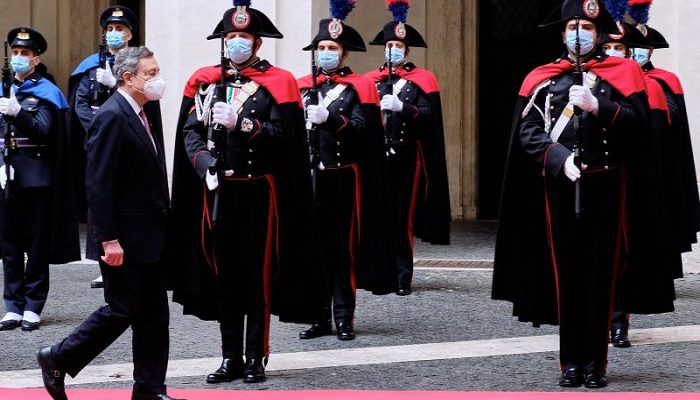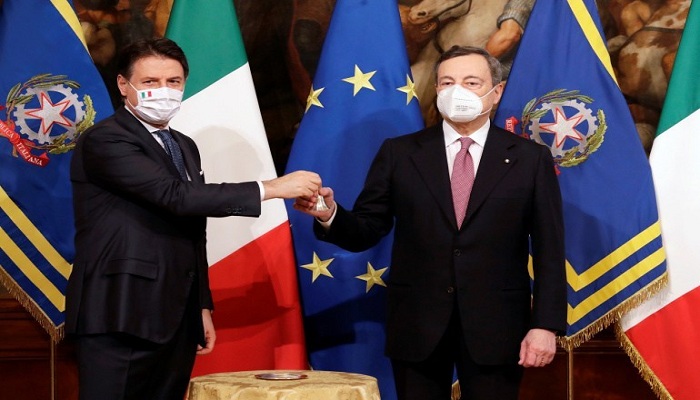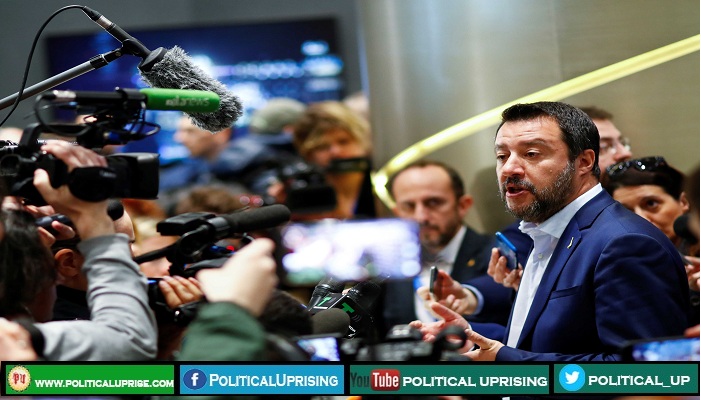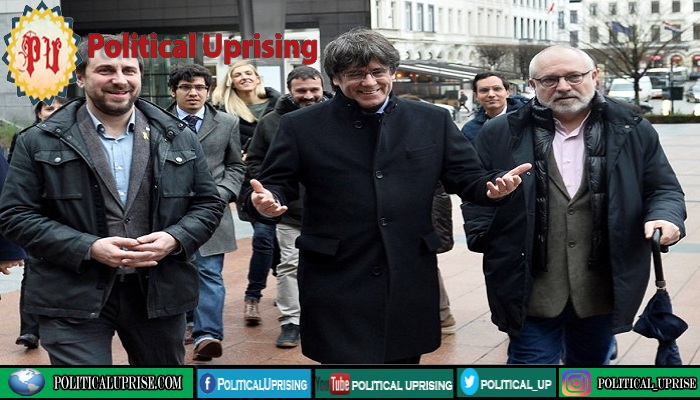Former ECB chief Mario Draghi turned Prime Minister, will now work to ease the economic and health challenges gripping the country.
Weeks after a rebellion in the ruling coalition plunged Italy’s government into crisis, the former head of the European Central Bank, Mario Draghi, has been confirmed as the new prime minister.
His main task? Leading Italy out of a year-long health emergency and economic crisis.
Draghi’s cabinet includes 15 members from all major political parties from the centre-left Democratic Party to the far-right League and eight technocrats at the helm of ministries that are implementing Italy’s economic and social recovery plans.
The formation of a new government has caused an internal rift in the populist Five Star Movement, with some of its MPs likely to vote against the new government when Draghi faces confidence votes in Italy’s two chambers on Wednesday and Thursday this week.
Even so, the new government is set to enjoy one of the largest majorities in the country’s history. The only notable party opposition party left is the post-fascist Brothers of Italy, led by Italy’s only female party leader, Giorgia Meloni.
Italy’s main ruling parties discuss elections as Conte struggles for majority
A recent poll suggested Italians broadly support the new government. Sixty-seven percent are confident that Draghi’s policies will help the country out of the crisis, according to the survey in the financial daily newspaper Il Sole 24 Ore.
The biggest question now is how the new government manage the budget and choose to spend 222 billion euros ($270bn) in EU grants and loans available to Italy as part of the bloc’s coronavirus recovery package (NextGeneration EU).
Among those surveyed, the most sceptical are supporters of the Five Star Movement, the party that won the 2018 elections and had since governed with the League and the Democratic Party losing about half of its voters along the way.
On the street, support is more nuanced than it may appear in the largely favourable media coverage the new prime minister has so far enjoyed.
Many are relieved the crisis has ended, but the episode represented a schism between citizens concerned about their jobs and businesses, and the politicians elected to represent them.
Coronavirus crisis left Italy’s northern economic powerhouse disaster zone
Outgoing prime minister Giuseppe Conte was enjoying broad popular support when Matteo Renzi, who was Italy’s prime minister from 2014 to 2016 and now heads the small Italy Alive party which polls at just over 2 percent withdrew his support for the coalition, leading to Conte’s resignation.

“Given the chaos we were in, let’s try this one too,” said Piero Valusio, 53, who owns a bar in Lambrate, a multicultural district in Milan’s east.
Like other bar and restaurant owners, Valusio has been struggling to keep his business afloat amid full and partial lockdowns in the last year that saw him adjust to take-away only rules and evening closures.
“The only thing I can remember is that we are still crying from the last time we had technocrats in government. But let’s see,” Valusio said.
In 2011, a fully technocratic government led by economist Mario Monti was brought in after the resignation of Silvio Berlusconi to avoid the country’s economic collapse in the wake of the sovereign debt crisis, implementing controversial reforms and emergency austerity measures aimed at restoring the confidence of international markets.
At the time, Draghi had been at the helm of the European Central Bank and had infamously co-signed a letter with outgoing ECB president Jean-Claude Trichet asking Berlusconi’s government for reforms and spending cuts.
Mafia in Italy poised to exploit coronavirus
He was then nicknamed “Super Mario”, credited with saving the EU’s single currency when he told market speculators in 2012 the ECB was ready to do “whatever it takes to preserve the euro”, easing Spanish and Italian borrowing costs.
One major difference is that Draghi’s government has money to spend to expand Italy’s economy.
“He will have an incisive role on the economy of this country,” said Laura Elia, a 31-year-old teacher. “Compared to going to elections, I see this as a positive solution given the emergency situation we’re in.”
The pandemic and more than 10 years of economic stagnation have caused soaring levels of poverty and inequality that have hit young people and women particularly hard the Italian Institute of Statistics (ISTAT)’s latest unemployment data shows that 98 percent of those who lost their jobs in December were women.
Italy’s public debt is forecast to rise to 158 percent of GDP in 2021 second only to Greece.
The scale of the challenges has led the EU to approve the largest spending package ever financed through its budget and to suspend its budget rules, allowing Italy and other countries whose economies have been badly hit to raise public debt.
As the third-largest economy in the bloc, Italy is due to receive the biggest slice of the pie (although not the largest as percentage of GDP) and its success in implementing reforms and ensuring its economy is brought back on track will be closely watched, particularly by the “frugal” northern countries who had pushed to cut the recovery package and by the international markets, which have reacted positively to Draghi.
Daniele Albertazzi, who is reading politics at the University of Birmingham, says it is not the first time Italian politicians hand over political choices to a “technical” figure in a crisis.
“I think it is questionable that every time there is a crisis, Italian politicians pretend to take three steps back and put forward these saviour figures,” said Albertazzi, who researches populist right-wing parties.
“This is how you destroy the idea of a political class that is accountable towards its electorate for the choices it makes. Politics cannot be there just when everything goes well. Imagine a surgeon leaving the operating room every time things get critical,” Albertazzi.
“This is how you fuel resentment towards the political establishment. Politicians pretending decisions that are made are not political decisions, that it’s just the way it should be done.”
One party that might benefit from this is Meloni’s Brothers of Italy, which set out as the smallest party in a right-wing coalition including Matteo Salvini’s League and Berlusconi’s Forza Italia, and has been growing steadily in the polls while attracting some of the League’s voters. But the latter still tops most opinion polls for voting preference.
“COVID-19 has not been kind to populists. They have lost some consensus,” Carlo Ruzza, professor of political sociology at the University of Trento said. “In a situation where people have lost their jobs and are concerned about their health, [a situation] that needs the EU to be solved, being anti-European the way the League was before the pandemic makes no sense.”
Behind Salvini’s choice to support Draghi’s government are the economic interests of northern industrialists and business categories that have traditionally been pillars of the party’s support base.
“The crisis is partly a continuation of the 2011 crisis, from which Italy never emerged,” Ruzza said. “It isn’t simply economic. It’s a crisis of identity and certainties, particularly in the prescription of nationalist parties.”



